The flood’s begun, this I know, for the New York Times tells me so: Americans Head to New Zealand and Leave ‘the Chaos’ Behind.
Now NYT trend pieces, like tequila shots, are best taken with a pinch of salt. (Also this week: hot rodent men!) This particular brief finds “5,874 Americans moved to New Zealand between June 2022 and June 2023.” The number’s a tad misleading—for one thing, that’s anyone moving to NZ from America, including Kiwis going home.1 There’s more but I’m holding that for a closing kicker. Stick around.
What’s missing here, really, is context. That estimate—and stats released this week that bring us up to April 2024—are near records, the peak of a decades-long upward curve in US-to-NZ migration. The only year higher is 2020, when Jacinda was crushing the early pandemic. The exception proves the rule: The Americans are coming.
Let me be your anecdotal proof. Like the NYT story’s lead source, a 31-year-old wedding photographer named Lucy Schultz, I also moved to NZ in the pandemic. I, too, lay up at night worry over what Shultz memorably calls America’s “endless time warp of confusion.” And like Lucy I am regularly awed by NZ’s abundant and even friendly public bathrooms. In the Wellington loos an automated voice announces you’ve got ten whole minutes to yourself, then plays you Burt Bacharach.
But who cares about a few lost Americans? It’s musical chairs out there these days. Kiwis are leaving the country in record numbers, seeking better pay and dry homes across the ditch in Australia. Meanwhile, near-record numbers of Indians, Philipinos, and Chinese are moving in, presumably to snap up the low-paying gigs and damp rentals the locals left behind. NZ journalist
does the math: on average, 588 New Zealand citizens moved away on each day in April 2024.Crunching the same spreadsheets I get a ballpark figure of 17 immigrants flying here every day from the United States. Three would be Kiwis returning home, and another two are neither Kiwis or Americans. And the rest—that’s an dozen American citizens now moving to Aotearoa every single day.
That’s not massive. Scale is everything in US/NZ conversations. Here’s a study that found the equivalent of 60 Americans moving daily to the UK last year, and 54 to Mexico. But check that against population (UK at 67 million, Mexico 128 million) and the dear 5 million souls of NZ are, to borrow a favorite crutch here, punching above their weight. Good on ya, NZ!
And how many more will come, if things go sideways after the election in November?
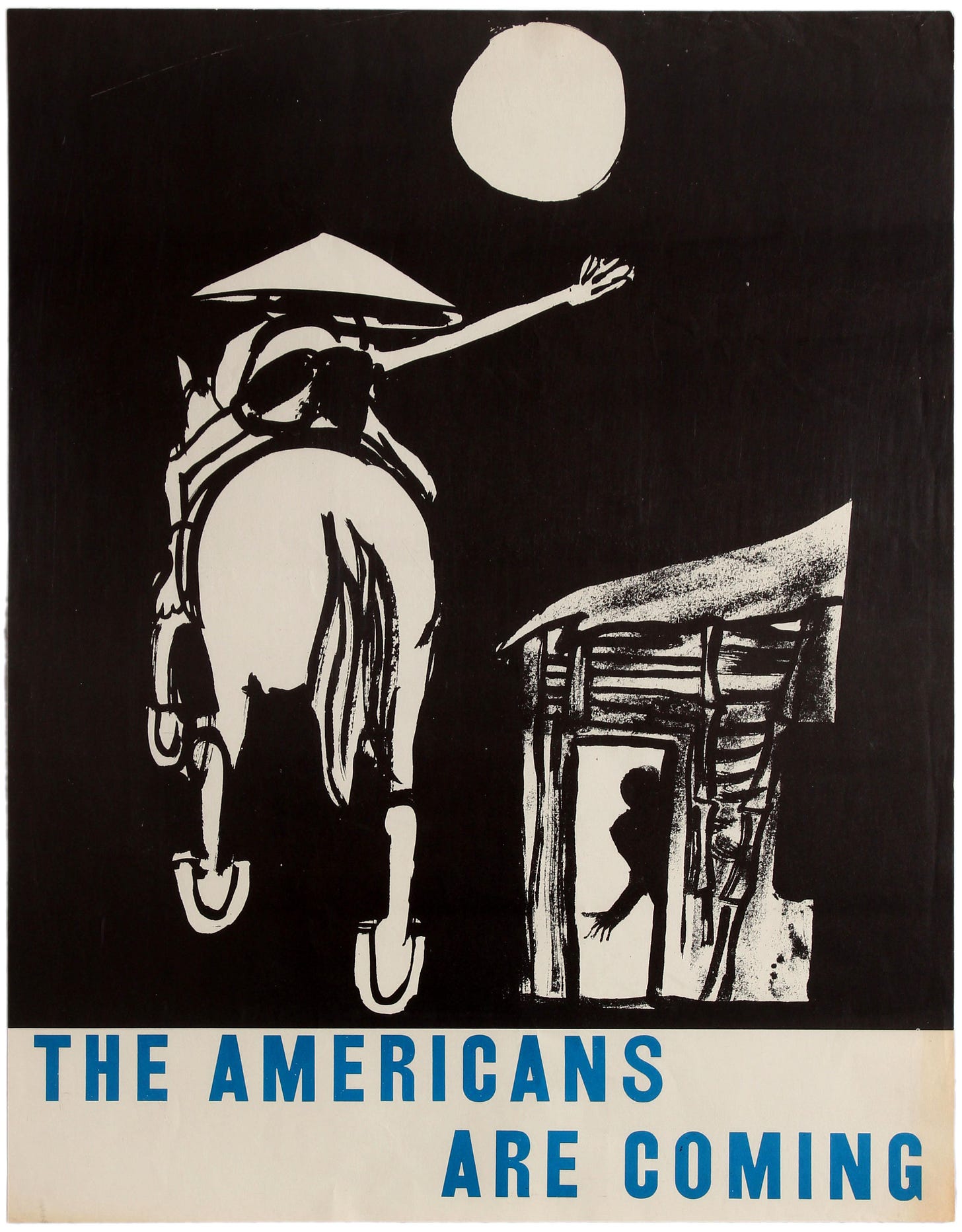
There’s an NYT trend piece for that, too. Consummate D.C. insider Peter Baker dropped the mighty ex- word just last month in his story Gallows Humor and Talk of Escape: Trump’s Possible Return Rattles Capital.
They’re joking. Sort of. At least in most cases. It’s a gallows humor with a dark edge. Much of official Washington is bracing for the possibility that former President Donald J. Trump really could return — this time with “retribution” as his avowed mission, the discussion is where people might go into a sort of self-imposed exile.
Baker makes no mention of New Zealand, but Kiwis shouldn’t take offense. This is the D.C. cocktail circuit, self-styled winners of the meritocracy and arguably the least she’ll-be-right tribe on the planet. Baker finds them eyeing Canada, France, Poland, and of course Portugal, the new Berlin. He’s grinning as hard as he can but the worry is real. Red sky at morning, sailors take warning. Americans are starting to pack. Sort of.
Here’s the big picture: both NYT stories are simply more genteel entries in a vast post-pandemic tide of Americans Leaving America content out there.
The dispatches come in two main flavors. First, there’s the light-hearted cultural exchange: Under the Tuscan Sun or even Eat, Pray, Love would today be spooned out in Tiktoks (or, ahem, Substacks). Here in NZ, Kiwiamericans, aka Tara Hulbert, formerly of Milwaukee, has made a social media career extolling the low-key, low-consumption joys of Kiwi life: “How many times have I gotten a tea towel for a present?”
There’s also the same trauma plot that’s every character’s backstory these days. In January 2021, Monica Zielinski, an American woman living in Poland took to Tiktok to ask her fellow expats: “What is one time you realized America really messed you up?” The bit went mildly viral, among expats anyhow, and she got a lot of sad stories in reply—or rather, happy stories where the gun doesn’t appear and the hospital is free.
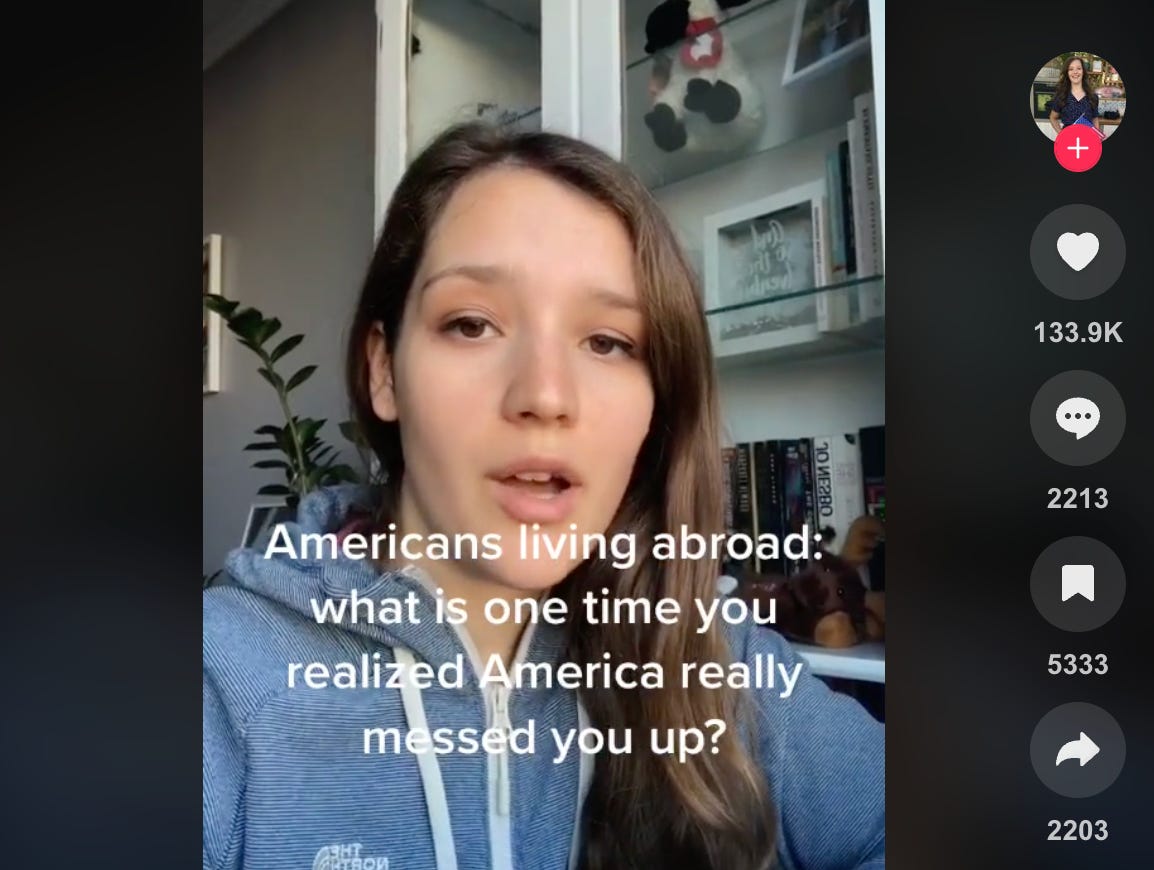
I have to say: Americans are good at this shit. We’re oversharers, and we’ve been reviewing products all our lives. PTSD plus a Yelp of nations: this is our art, and it’s compelling as hell. There’s the delight of confronting the different and distant, served alongside all your frustrations about the country to which you were born. Scroll on your couch in the States and there’s an endless stream of bright young things literally showing you the way out. A CNN roundup of the genre found the user comment that summed it up: “The American Dream is to Leave America.”
Catchy, no? It’s not the phrase’s first appearance, but it’s definitely a thing now. Drop it in Youtube if you want an evening’s rathole.
Better yet, just sit with that koan awhile. At first glance, it’s classic expat neoliberalism. Let’s say, for shorthand, that the American Dream is ‘work hard and you’ll get ahead.’ (Ahead of who, exactly, the Dream is careful not to say. Your younger, poorer self? Your neighbors. Your parents, for sure.) Hard times at home? Shift your operations overseas for the lower cost of living, then work hard and get ahead there.
On another level, though, ‘The American Dream is to Leave America’ is a truly odd bit of poetry, an ourobouros-like remix of Allen Ginsburg’s classic taunt. But where Ginsburg pointedly stays home (“America I’m putting my queer shoulder to the wheel”) the new mantra reframes the act of leaving as not a rejection of the nation but instead a natural extension of our national creed.
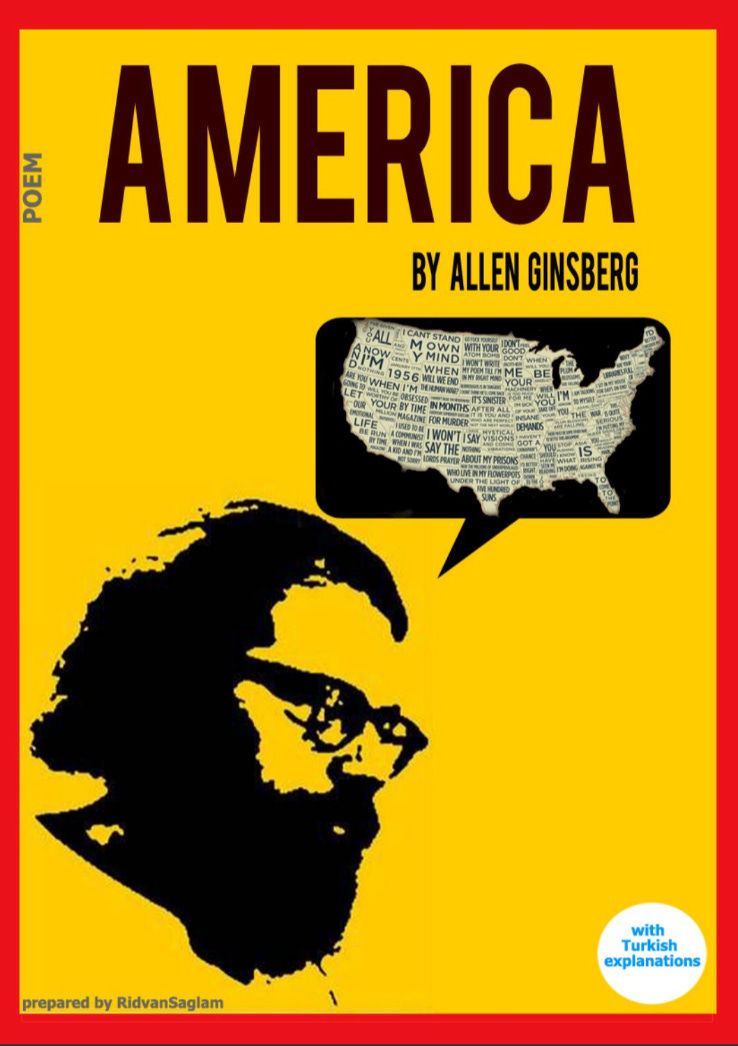
Weird, ain’t it. Do the Irish complete their Irishness by moving to Boston? Is a Frenchman a more realized Frenchman for settling in Shanghai?
This is the best and worst of us, right there. A nation built on an idea, rather than blood and soil—I’m a hopeless romantic for this one, still. But then we cart that damn Big Idea everywhere, showing it off like a bald eagle in a cage. Our turn as a superpower only made the eagle prouder and harder to shake. We bitch and moan and even bail, but outside a few hardcore apostates we still see ourselves atop the leaderboard. We invented rock n roll, y’all! Hiphop too. We’re your arms dealer, your soda pop, your AI. Kiwis flew to damn Australia just to see Taylor Swift. Our trash is still on the moon.
Exceptionalism has always been a wobbly claim, of course, but since the twin whammies of Trump and the pandemic we’ve lost that swagger bigtime. For a grand summary of our angst, it’s hard to top
’ recent manifesto “The Way We Live in the United States is Not Normal.” (On stress-induced social atomization: “If you showed up at someone's house in Washington, DC, unannounced, you would be considered a sociopath.”) Powers has had enough. She’s moving to Italy, where she and her partner bought a little orchard down in the Boot. Peace and quiet, handsome stone walls, and “enough outdoor space to host retreats.” But she’s not giving up on the American Dream, far from it. In fact, Powers ends her otherwise thundering Goodbye-to-All-That with good ol’ Obama evoking America as an exceptional idea:And so the world watches America—the only great power in history made up of people from every corner of the planet, comprising every race and faith and cultural practice—to see if our experiment in democracy can work.
And when it doesn’t work? What then?
The Dream to Leave is one thing.
The Dream is Dead is another altogether. The Dream is Dead is exile, and exile is one idea Americans simply cannot comprehend.
This blog likes to cite. To the master we go. Edward Said:
Exile is strangely compelling to think about but terrible to experience.
The Tiktokers, the Youtubers, and me: guilty, guilty, guilty. Powers skates by here, I think. Said continues:
It is the unhealable rift forced between a human being and a native place, between the self and its true home: its essential sadness can never be surmounted. And while it is true that literature and history contain heroic, romantic, glorious, even triumphant episodes in an exile’s life, these are no more than efforts meant to overcome the crippling sorrow of estrangement. The achievements of exile are permanently undermined by the loss of something left behind forever.
Americans pursue happiness, y’all. “Essential sadness” is total Old World vibes. Rift with the native place? Ask an American where she’s from, and most will drop two-three-four states, cultures, religions, races, countries of origin. We leave behind shit all the time. We’ve just never believed you can leave something behind forever.
Maybe it’s time we learned. Maybe that’s what November will teach us.
Because what’s missing from ‘The American Dream is to Leave America’ is, well, the missing.
Whatever our current soft exile—fleeing the chaos, “sort of self-imposed,” TikTokking or blogging with Said in hand—we’ve removed ourselves not from an idea but a very real concrete object. An actual hunk of land, a big one, with actual people walking (OK, driving) around on top. The family, the friends, the loud voices and full confessions, the light of one particular field or mountain or street on a summer evening. The smell of the desert after the rain. Hell, the smell of the freeway after the rain.
This is what Said’s trying to tell us. For Said, the pain of exile is the loss of home. When true exile comes for Americans, it will be the loss of choice that breaks our hearts.
Here’s what the stats in that NYT story don’t show: For every 12 Americans flying here, 8 pack it in and go home.
Kiwiamericans surprised us all the other day with video shot down by the Wellington docks on a golden autumn evening.
She was going home. For family.
“You can be in the most beautiful place in the world, but if you don’t have the people that you love around you, it’s not as great,” she said.
Her channels will continue, she promises. The return will doubtless give her some great material. We grow. We change.
“Keeps the content interesting,” she said. “No person fits in one little slot. I’m not just talking about living in New Zealand for the rest of my life.”
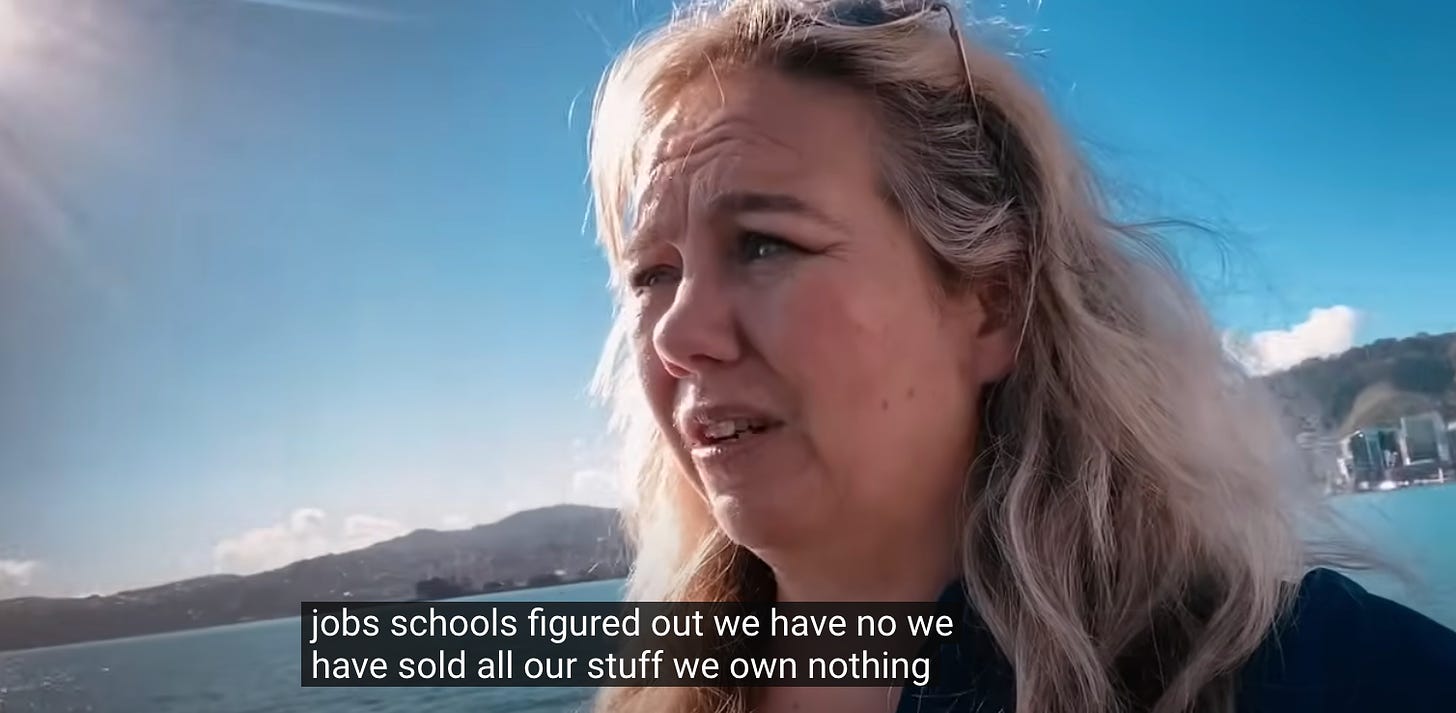
That’s how the reporter, Auckland-based Pete McKenzie, originally wrote the story. When I couldn’t match his number in the Stats NZ files I reached out to him, and he graciously gave me the backstory. Seems somewhere in the writing process the original wording was compressed to simply “Americans.” As a former AP correspondent myself, I’ve been there: word counts can be hell on nuance. (UPDATE: I’ve tweaked my own original wording here to more accurately reflect what happened.)


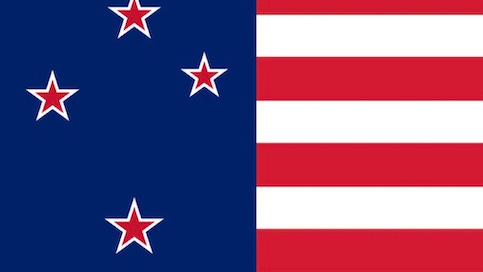


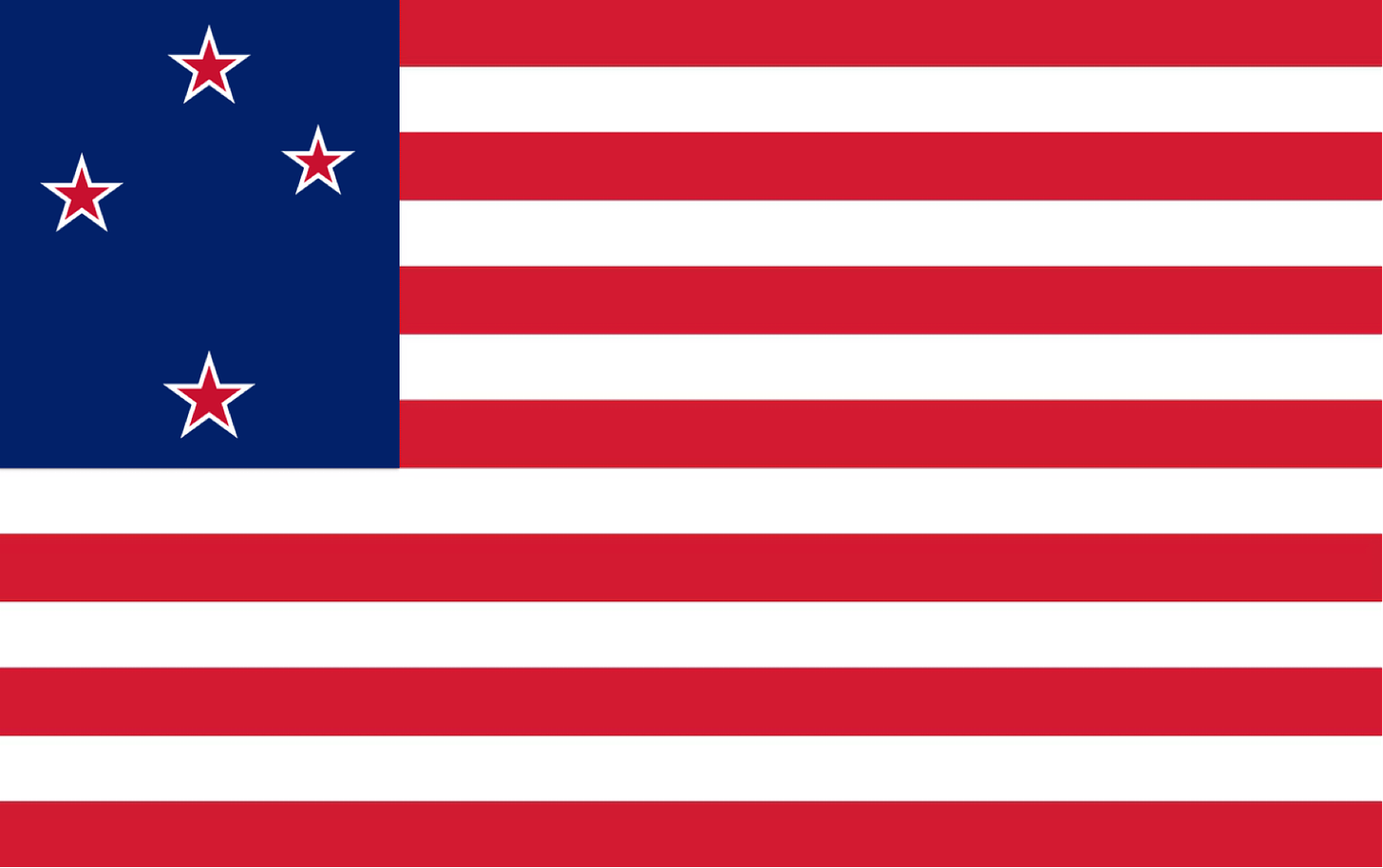
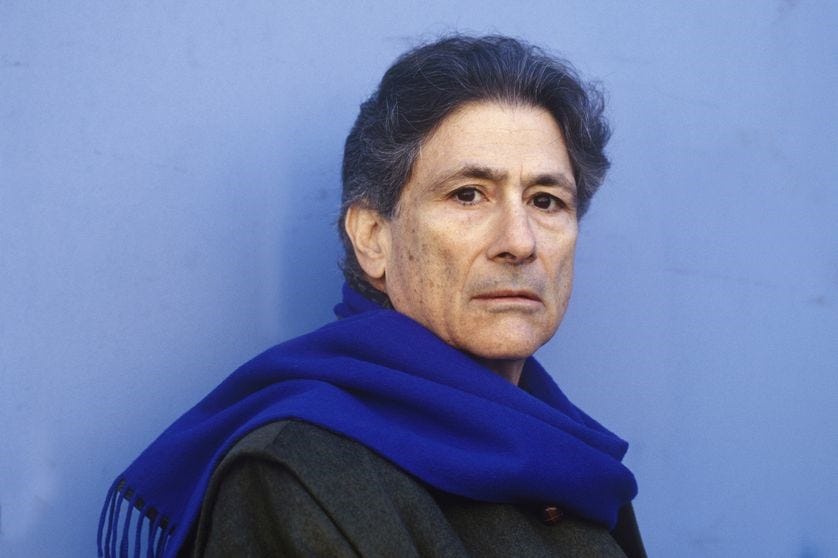
That user comment (“The American Dream is to Leave America") is everything.
"PTSD plus a Yelp of nations: this is our art, and it’s compelling as hell." - This had me laughing. Great article Dan, thanks for sharing all these resources and links!